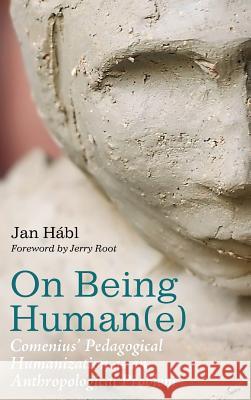On Being Human(e) » książka
On Being Human(e)
ISBN-13: 9781532600586 / Angielski / Twarda / 2017 / 202 str.
On Being Human(e)
ISBN-13: 9781532600586 / Angielski / Twarda / 2017 / 202 str.
(netto: 177,87 VAT: 5%)
Najniższa cena z 30 dni: 183,68
ok. 16-18 dni roboczych.
Darmowa dostawa!
There is a difference between that which is and that which is to be. Anthropologically: there is a way I am, and the way I am to be, or not to be. How are we to explain this? This book presents the argument that human nature is both complex and complicated in at least two specific ways--ontologically and ethically. In our being we are indisputably good, dignified, worthy, important, or even noble. But in our morality we are ambivalent--capable of both good and evil, the humane and the inhumane. In his paramount work Jan Amos Comenius expresses the goal of his lifelong endeavor: --to help keep man from falling into a non-man-- (Pampaedia). If human beings are to become what they ought to be, they need to be educated towards humanity, says Comenius. But the fundamental question is, what is a human being? And what ought one to be? --Salt ought to be salty. A river ought to be clear. A knife ought to be sharp. But what ought a person to be?-- What is the essence of our humanity? And how can that be cultivated or educated? This book presents Comenius's answers to these questions. --Jan Habl has done a wonderful service for educators everywhere by recalling Comenius's vision of what education is and what education should be. Two types of educators will especially benefit: those who find beauty and truth in creation and Scripture, and those who value virtue and piety as worthy educational goals. Reading this book can only encourage deep thought, productive discussion, and, in Comenius's own words, motivation 'to follow Him.' It is deserving of a wide audience. I enthusiastically recommend it.-- --Duane H. Elmer, PhD, Distinguished Professor of Educational Studies, Emeritus; G. W. Aldeen Professor of International Studies, retired, Trinity International University/Divinity School --Professor Habl has provided us a fascinating and wide-ranging exegesis of Comenius's anthropology and the many implications for education and human flourishing. I highly commend this book to all who are called to the task of education and wish to think well about the ends and means of this endeavor.-- --Stan W. Wallace, President and CEO, Global Scholars Jan Habl is a professor of pedagogy at universities in Usti nad Labem and Hradec Kralove (Czech Republic).
There is a difference between that which is and that which is to be. Anthropologically: there is a way I am, and the way I am to be, or not to be. How are we to explain this? This book presents the argument that human nature is both complex and complicated in at least two specific ways--ontologically and ethically. In our being we are indisputably good, dignified, worthy, important, or even noble. But in our morality we are ambivalent--capable of both good and evil, the humane and the inhumane.In his paramount work Jan Amos Comenius expresses the goal of his lifelong endeavor: ""to help keep man from falling into a non-man"" (Pampaedia). If human beings are to become what they ought to be, they need to be educated towards humanity, says Comenius. But the fundamental question is, what is a human being? And what ought one to be? ""Salt ought to be salty. A river ought to be clear. A knife ought to be sharp. But what ought a person to be?"" What is the essence of our humanity? And how can that be cultivated or educated? This book presents Comeniuss answers to these questions.""Jan Habl has done a wonderful service for educators everywhere by recalling Comeniuss vision of what education is and what education should be. Two types of educators will especially benefit: those who find beauty and truth in creation and Scripture, and those who value virtue and piety as worthy educational goals. Reading this book can only encourage deep thought, productive discussion, and, in Comeniuss own words, motivation to follow Him. It is deserving of a wide audience. I enthusiastically recommend it.""--Duane H. Elmer, PhD, Distinguished Professor of Educational Studies, Emeritus; G. W. Aldeen Professor of International Studies, retired, Trinity International University/Divinity School""Professor Habl has provided us a fascinating and wide-ranging exegesis of Comeniuss anthropology and the many implications for education and human flourishing. I highly commend this book to all who are called to the task of education and wish to think well about the ends and means of this endeavor.""--Stan W. Wallace, President and CEO, Global ScholarsJan Habl is a professor of pedagogy at universities in Usti nad Labem and Hradec Kralove (Czech Republic).











